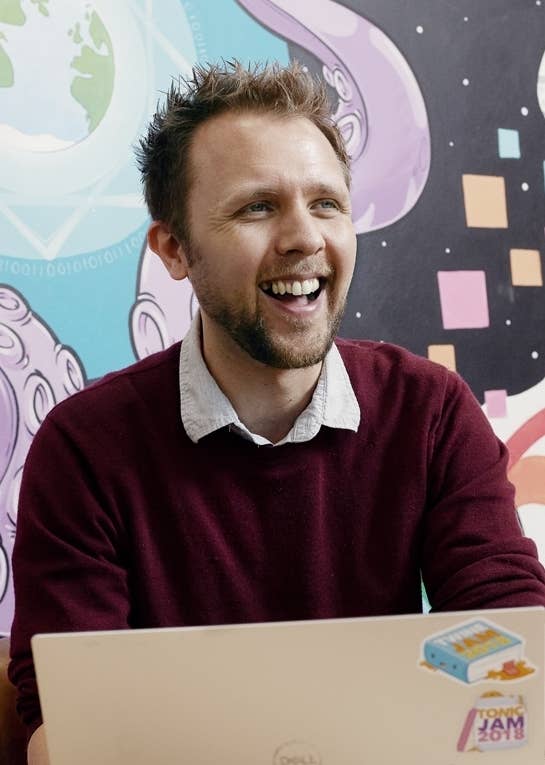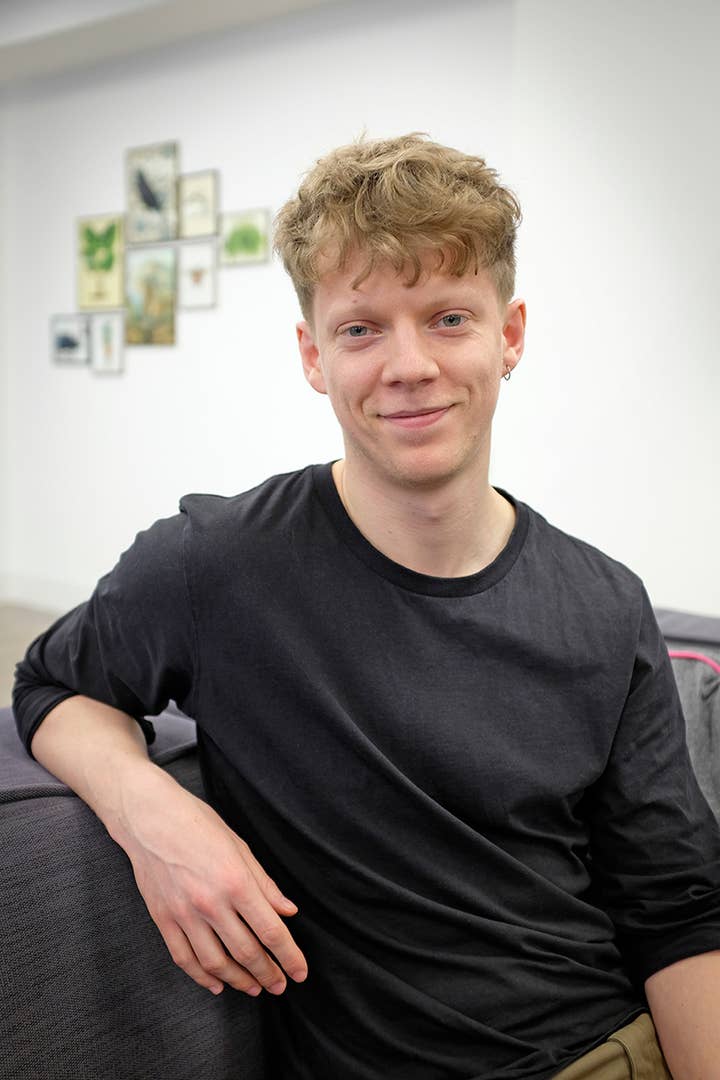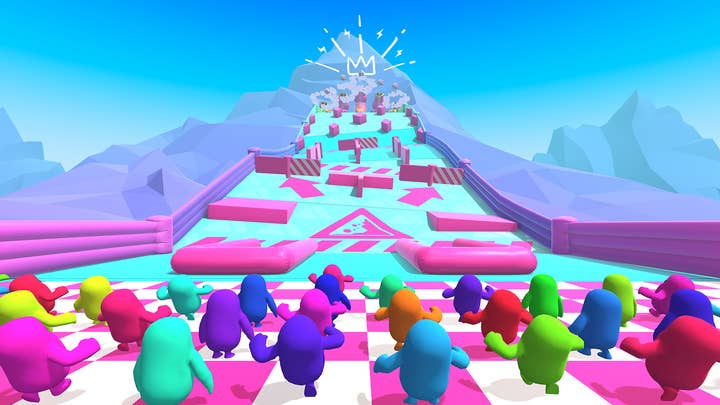Fall Guys: The battle royale where you don't kill anyone
Mediatonic talks us through it's game show-inspired multiplayer title it believes can reach an even broader audience than Fortnite
The months before GDC is when UK studio Mediatonic dedicates more time to coming up with new ideas and game designs. But in January 2018, there was one particular design the studio was keen to avoid.
"We knew [the market] would be absolutely saturated with battle royales, everyone would be pushing battle royales, so I told the team, 'Whatever you throw at me, don't make it Battle Royale,'" says creative director Jeff Tanton. "And then Joe [Walsh, senior game designer] came to me and said, 'Look, it's a battle royale, but...'"
It was a crucial 'but'. Fall Guys: Ultimate Knockout is indeed a battle royale, but with little to no emphasis on the battle part. It still has 100 people playing simultaneously, and only one winner can emerge, but the victor is decided by a series of four or five mini-games, each one eliminating swathes of players from the competition.
Rounds might involve running through a series of walls where only one of the doorways can be smashed through, stealing golden eggs from a giant chicken, or surviving treacherous obstacle courses. And the grand finale: running up Fall Mountain, trying to avoid the crushing boulders and wildly swinging hammers as you try to be the first player to grab the crown at the summit.
Plenty of readers who have watched the trailer might have noticed there's more than a passing similarity between these and some of the bizarre rounds in Japanese game show Takeshi's Castle -- something Tanton admits the team has watched a lot. And not just that show, but Total Wipeout, Ninja Warrior, It's A Knockout and all manner of unusual game shows.

"It seems to be a rich vein, starting at Takeshi's Castle and working out from there," says Tanton. "The thing that shocked us was that when we looked at these quiz show obstacle course battlers, we had to roll back and think, 'Someone must have done this before.' Because once the idea's there, it feels incredibly obvious, but no, nothing has been done -- certainly not on the scale we're looking at."
Walsh adds that the concept evolved from looking at large-scale multiplayer experiences that weren't directly focused on PvP, as is the case with Fortnite, PUBG and the like.
"We started talking about players vs systems in a variety of ways, whether that's roguelikes or puzzle games, and that's how we ended up with the game show thing. It seems like the ultimate player vs system: people build these sadistic courses for you to throw yourself at.
"It's a really nice way to have players interact with each other, but not in a way that feels too combative or too conducive to toxic behaviour. You're always really against the course together, more than against each other."
He notes that the team was also inspired by previous game show-esque experiences already seen in video games, such as Xbox's 1 vs 100 or mobile sensation HQ Trivia -- in fact, the latter had several people in the studio setting their alarm to ensure they could all take part in the real-time quiz together.
"We want anyone to be able to come to Fall Guys. You should be able to hand the controller to someone who's just wandered into the room, and tell them in four words what to do"
Jeff Tanton, Mediatonic
The aim is to recreate the escalating tension of both these games and battle royales, where the opening minutes feel like a disposable match where it doesn't matter if you're knocked out early, but the further you progress, the higher your stake in the game is.
"There's that moment when you're down to the last few players, you get that adrenaline rush and it feels like the battle royale rush of being in the circle at the end," says Walsh. "We felt like there must be other ways you can create that feeling in a fresh and colourful setting.
"We want people to reach the line-up before the last level and to feel like a big deal, like a pro -- but they're this adorable, waddling little jelly bean. That just felt inherently funny."
Tanton notes that the rise of Battle Royale has boosted the studio's confidence in Fall Guys, because the premise of a last man standing competition has become so familiar. Even so, the team had to be careful about how it pitched the game to publishers, eventually winning over Devolver Digital.
"We knew that battle royale would be an instant yes for a lot of people, but a flat no for others. So we had to show what else this game was offering and why we're excited about it."
Variety is part of Fall Guys' appeal. Rather than always battling it out on the same map, a la Fortnite, the selection of rounds will be different every time. 30 different mini-games will be available at launch next year, with more to be added after launch. Some will be more suited to larger numbers of players, others will be reserved for when the herd has been thinned, but it will always end with that battle to climb Fall Mountain.

And, again, there will be no killing. There may be some rough and tumble, a little grabbing and pushing as you try to get through the crowd, with Walsh underlining the importance of not having a direct attack button. Tanton says the aim is to "replace combat with competition" and prove that it's just as compelling a concept.
"Combat within video games has proven incredibly successful, but it leaves a lot of people out," he says. "Our experience with mobile games has taught us this. There are people who love shooting other people in the face, but if you treat those as the ones you must please all of the time, you're leaving out a huge amount of people. They either don't want to shoot people in the face, or have realised that the act of that has become so skilled and so twitch-perfect for a certain subset of players at this point that even if they wanted to get involved, there's such a huge learning curve.
Walsh adds: "There will always be shooters and we're not looking to replace those, by any means, but there is a huge group of people who want a competitive spirit but without having to master dual-analog twitch gameplay. Those games are difficult and challenging, and a lot of time you leave them as a new player feeling like you're missing out on something."
"We're just bitter because we're terrible at them," Tanton laughs.
Another benefit of basing Fall Guys on these wacky game shows is that it becomes inherently watchable if you have been eliminated. While Fortnite players will immediately exit to the lobby and search for another match, Mediatonic hopes players will watch for the rest of each match to see how it plays out -- if only to see some of the other rounds they might encounter next time. There's even talk of giving players tokens they can use to bet on the remaining contestants, earning in-game currency if their chosen Fall Guy wins.
"There is a huge group of people who want a competitive spirit but without having to master dual-analog twitch gameplay. Those games are difficult, and leave a new player feeling like you're missing out"
Joe Walsh, Mediatonic
While their antics have been inspired by real-world game shows, the Fall Guys themselves have been designed as a blank slate, with Tanton describing them as "sports mascots meets vinyl toys."
"There was no joy in realism for us," he said. "The GIFs already exist if you want to see people get hammered in Takeshi's Castle or that sort of thing. We were trying to create something that felt like it could just bounce back from anything, but was also uniquely designed to be terrible at everything we needed it to do, in the same way that It's A Knockout would routinely dress people in giant costumes before making them complete an obstacle course."
This also ties into the character customisation. With no weapons and associated skins to unlock, making your Fall Guys unique is how Mediatonic hopes to get players more invested in their character. There will be paint jobs, decals, mascot-style costumes, emotes and more, all of which can be unlocked with the in-game currency you earn by surviving rounds.
There are also plans for a different currency and items reserved only for those who have won an entire match. Even without these, players will appear with a crown floating about their head the next time they play to signify they won the previous match -- something Walsh hopes will "give you a sense of who you should be worried about on that starting line."
But the true sign of Fall Guys' potential lies in the rounds themselves. Walsh says the team has avoided just designing A to B obstacle courses, claiming there "really is no limit to the type of things we can get players, as long as there's a clear goal and a way of eliminating players."
"We've been thinking about different versions of playground tag, hide and seek, musical chairs, or splitting people into teams and having them do tug of war or the giant skateboard race from the trailer," he continues.
"That's one of the exciting things about the game: over time, we can keep adding more and more levels. That grab bag [of rounds] will just get bigger and bigger, so the game will be at its best a year down the line when we've had time to build new things and experiment with them."
Tanton adds: "We have a whiteboard covered in post-it notes with mostly terrible ideas, which we are whittling down to 30 quite good ideas and when we start playing with them, we'll make them properly good. There has been a huge response in the studio across all teams with good round ideas."
"We want anyone to be able to come to Fall Guys. You should be able to hand the controller to someone who's just wandered into the room, tell them in four words what they need to do, and they might not be great at it but they should at least be able to make a good go at it."
Fall Guys is due for PlayStation 4 and PC in 2020, but Mediatonic "would love to bring it to all platforms at some point." The team has even been drawing on its experience with mobile games to design a potential account system that might enable players to log in on other devices -- even the next generation consoles if the game becomes popular enough to warrant a port.
"For us, there is no endpoint if the game is a success," Tanton concludes. "We're used to the ethos of if a game takes off, you need to keep adding content and features and doing things to ensure it remains a success. So we haven't put a lifespan on it at all."


